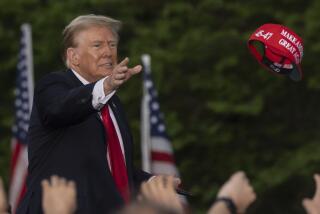COLUMN RIGHT : Ideas Drive Politics, and Bush Has None : Democrats have jerked him about because he signaled flexibility.
President Bushâs inept budget dealings will cost him dearly. He has lost credibility; the word will be given a workout in the weeks ahead. His feckless repudiation of his own positions, staked out only days earlier, will no doubt be assembled into a devastating videotape, to be cherished and circulated by the Democratic National Committee. Bush may nonetheless be consoling himself with the thought that he will at least come away with his five-year, $500-billion deficit reduction, if at high political cost.
Iâm told that earlier this year Budget Director Richard G. Darman reassured the President that if the deficit-reduction package became law, he would not have to worry his head about mundane fiscal matters for the remainder of his first term. Things are not likely to work out so easily.
For the record:
12:00 a.m. Oct. 26, 1990 For the Record
Los Angeles Times Friday October 26, 1990 Home Edition Metro Part B Page 7 Column 1 Op Ed Desk 2 inches; 52 words Type of Material: Correction
In Tom Bethellâs commentary Oct. 25, several figures were incorrectly expressed in billions. The correct figures are: total government spending for fiscal 1990-$1.26 trillion; projected government spending for the new fiscal year-$1.36 trillion; projected spending for fiscal year 1992-$1.392 trillion (which would have been $1.442 trillion if not for âcuts.â)
In his unsuccessful televised appeal earlier this month, President Bush remarked that âitâs the toughest deficit reduction package ever,â with âthe largest spending savings ever--more than $300 billion.â For the first time, he boasted, Democratic leaders of Congress had agreed to âreal cuts,â with âno smoke, no mirrors, no magic act.â
Budget numbers are tedious, but I beg the readerâs indulgence. To a surprising degree, the following figures have been overlooked in all the budget maneuvering. Notice the awkward phrase used by the President: âSpending savings.â That suggests smoke and mirrors right there.
In fiscal 1990, the year that ended on Sept. 30, total government spending was $1.26 billion. In the year just beginning, including the famed deficit reduction, projected government spending will be $1.36 billion. That is an increase of $100 billion, or 8%. For comparison purposes, the total federal budget at the time of John F. Kennedyâs inaugural was $100 billion. Today, a one-year increase of that amount is called . . . deficit reduction! How can this be?
The government was planning to increase spending by an even greater amount (by about $124 billion). But then the estimators lopped off $24 billion and said they had âcutâ spending by that amount. Thatâs called adjusted consolidated base-line budgeting, and you donât want to know anything more about it. In the next fiscal year, 1992, spending goes up again, to $1.392 billion, and in case you were wondering, thatâs another âcutâ (because otherwise it would have been $1.442 billion). Smoke and mirrors, I would call it.
So far, the news media have been very polite about all this and more or less have refrained from pointing out the embarrassing details, but any day now they will begin to do so. Bush will find out what âdeficit reductionâ really means: spending increases, with new taxes to pay for them. The â$500-billion deficit reductionâ will be re-labeled the â1990 Bush tax increase.â
In 1982, incidentally, President Reagan was hoodwinked in much the same way, with a promise by Congress that it would give him $3 in spending cuts for every $1 that taxes were increased. He delivered on the taxes, but Congress went on spending as before. In fiscal 1980, which ended just before Reagan was elected, total federal spending was $591 billion. Between 1981-91, tax revenues increased by 90%. But spending increased by 107%. Thatâs why we have a deficit today. Spending is out of control.
Revenues increased as much as they did because the economy was growing, and it was growing because tax rates were cut. Now they are being raised, and the effect on growth will not be good. Bush will be thwarted in his desire to forget about the budget. With tax increases, he will have to think about it endlessly.
The President is about to discover one of the great Washington paradoxes: Pragmatism doesnât work. It didnât work for Jimmy Carter and it wonât work for Bush. This seems odd, of course, because pragmatism means pursuing the workable rather than the ideal; being flexible rather than intransigent. But it has been noted in Washington that political appointees can cope with the bureaucracy more easily if they are academics with ideas rather than businessmen used to meeting a payroll. Itâs even more true at the presidential level.
Ideas drive politics; call it ideology if you will. Without it, youâre at sea. In recent weeks Bush has lamely pleaded that he would have liked a better deal, ideally, but those mean Democrats forced him to do what he had hoped to avoid. Once they saw that his point of compromise was movable, based on a desire to reach any agreement rather than a particular one, they kept moving that point further from his initial position. In short, they jerked him about, because he signaled flexibility. He has only himself to blame.
Now Bush is in trouble. Watch for references to his âcredibility.â
More to Read
Get the L.A. Times Politics newsletter
Deeply reported insights into legislation, politics and policy from Sacramento, Washington and beyond. In your inbox three times per week.
You may occasionally receive promotional content from the Los Angeles Times.










